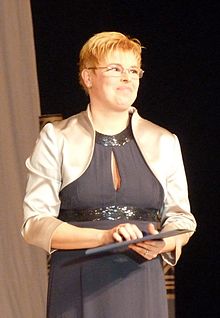Ágnes Farkas
| Ágnes Farkas | |||
|---|---|---|---|
 Farkas in 2015 | |||
| Personal information | |||
| Full name | Ágnes Farkas | ||
| Born |
21 April 1973 Budapest, Hungary | ||
| Nationality | Hungarian | ||
| Height | 1.84 m (6 ft 0 in) | ||
| Playing position | Left Back | ||
| Senior clubs | |||
| Years | Team | ||
–1992 | Építők SC | ||
1992–1993 | Budapesti Spartacus SC | ||
1993–1996 | Ferencvárosi TC | ||
1996–1997 | Borussia Dortmund | ||
1997–1999 | Podravka Koprivnica | ||
1999–2000 | Dunaferr | ||
2000–2003 | Ferencvárosi TC | ||
2003–2005 | Aalborg DH | ||
| National team | |||
| Years | Team | Apps | (Gls) |
1993–2004 | Hungary | 206 | (944) |
Medal record | |||
Ágnes Farkas (born 21 April 1973)[1] is a former Hungarian handball player. She won a gold medal at the 2000 European Championship, and earned a silver medal at the 2000 Summer Olympics and at the 1995 and 2003 World Championships.
Career
[edit]Club
[edit]Farkas started to play handball for Építők SC, where she stayed until 1992, when she moved to Budapesti Spartacus. A year later. she joined Ferencvárosi TC, where she spent six seasons. There, she has achieved her greatest club successes, including league and cup titles, EHF Champions League and EHF Cup silver medals. Thanks to her outstanding performances over the years, she is regarded as a club icon by Ferencváros fans.
She also competed abroad, playing for German side Borussia Dortmund and later collecting two Croatian cup and Croatian championship title with Podravka Koprivnica. Farkas played her last seasons for Danish side Aalborg DH, crowning her career with a Danish league silver in her final year.
Although in April 2005, Gjerpen IF offered her a one-year contract with the option for another year,[2] Farkas stated she has no desire to stay in professional handball and eventually retired at the end of the season.[3]
However, she did not stay away from the sport entirely after her retirement, as she trains children.[4]
International
[edit]She debuted on the Hungarian national team on 16 October 1993 against Poland,[4] and participated in her first World Championship in that year, finishing seventh. In 1994, she was named the top scorer of the European Championship. One year later, she was a member of the team that won a silver medal at the World Championship, organized jointly by Austria and Hungary. In 1996, she was forced to the sidelines by an injury and missed both the Olympic Games and the European Championship that year.
She placed ninth in the World Championship in 1997. She won a bronze medal on the European Championship the next year and finished fifth in 1999. She was a member of the 2000 Summer Olympics silver medal team,[1][5] and was also selected to the squad that triumphed at the European Championship the same year. In 2002, she achieved fifth place in the European Championship with Hungary and was given the award as top scorer.
She participated on the 2003 World Championship and also took part at the 2004 Summer Olympics in Athens, where Hungary finished fifth.[6]
Achievements
[edit]Club
[edit]- Nemzeti Bajnokság I:
- Winner: 1991, 1994, 1995, 1996, 2002
- Magyar Kupa:
- Winner: 1992, 1994, 1995, 1996, 2000, 2003
- German Cup:
- Winner: 1997
- Croatian Championship:
- Winner: 1998, 1999
- Croatian Cup:
- Winner: 1998, 1999
- Damehåndboldligaen:
- Silver Medallist: 2005
- EHF Champions League:
- Finalist: 2002
- EHF Cup Winners' Cup:
- Finalist: 1994
- EHF Cup:
- Finalist: 1997
- EHF Champions Trophy:
- Winner: 1999
- Third Placed: 2002
International
[edit]- Olympic Games:
- Silver Medalist: 2000
- World Championship:
- Silver Medalist: 1995, 2003
- European Championship:
- Winner: 2000
- Bronze Medalist: 1998
Awards and recognition
[edit]- European Championship Top Scorer: 1994, 2002
- Nemzeti Bajnokság I Top Scorer: 2001
- Hungarian Handballer of the Year: 2001, 2002[4]
- Knight's Cross of the Order of Merit of the Republic of Hungary:2000[7]
References
[edit]- ^ a b Profile: Ágnes Farkas sports.reference.com (Retrieved 19 December 2008)
- ^ "Farkas Ágnes Norvégiába szerződhet" (in Hungarian). Origo.hu. 12 April 2005. Retrieved 4 March 2011.
- ^ "Farkas Ágnes bejelentette visszavonulását" (in Hungarian). Origo.hu. 28 April 2005. Retrieved 4 March 2011.
- ^ a b c "Barkácsolásra váltott világklasszis kézisünk" (in Hungarian). Origo.hu. 9 July 2007. Retrieved 4 March 2011.
- ^ "2000 Summer Olympics – Sydney, Australia – Handball" Archived 7 April 2008 at the Wayback Machine databaseOlympics.com (Retrieved 19 December 2008)
- ^ "Hungary Handball at the 2004 Athina Summer Games". Sports-reference.com. Archived from the original on 17 April 2020. Retrieved 4 March 2011.
- ^ "Az államfő kitüntette az olimpia hőseit" (in Hungarian). Origo.hu. 14 October 2000. Archived from the original on 25 January 2012. Retrieved 16 August 2011.
External links
[edit]- 1973 births
- Living people
- Handball players from Budapest
- Hungarian female handball players
- Olympic handball players for Hungary
- Olympic silver medalists for Hungary
- Handball players at the 2000 Summer Olympics
- Handball players at the 2004 Summer Olympics
- Olympic medalists in handball
- Hungarian expatriate handball players in Germany
- Hungarian expatriate sportspeople in Croatia
- Knight's Crosses of the Order of Merit of the Republic of Hungary (civil)
- Medalists at the 2000 Summer Olympics
- RK Podravka Koprivnica players
- Expatriate handball players in Croatia
- Hungarian expatriate handball players in Denmark
